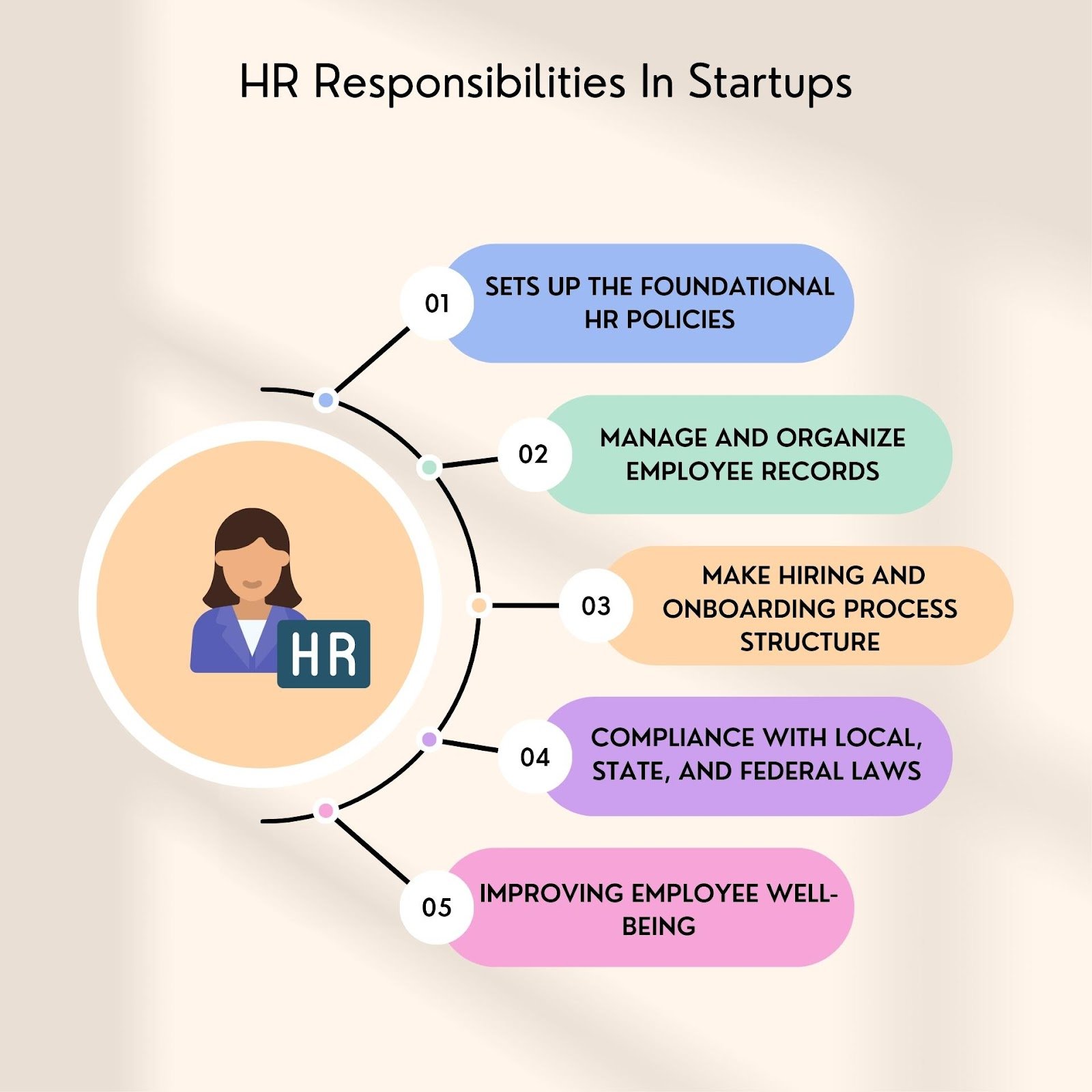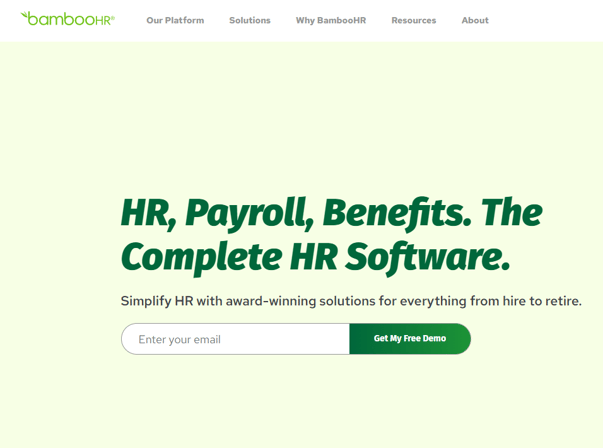Navigating the HR landscape can be a tricky task for any startup founder. You’re juggling multiple responsibilities, and time is a precious commodity. The challenge? Streamlining HR processes to boost productivity and save time.
The solution is simpler than you might think. With the right strategies, you can transform your HR tasks from time-consuming necessities into efficient, productivity-boosting activities. Let’s dive into how you can make this happen for your startup.
Does A Startup Need HR?
Yes, startups absolutely need HR, and here’s why. The exciting chaos of a startup often has its founders juggling numerous roles, including HR tasks, typically without any proper training. They’re racing against the clock, striving to transform their venture from a fledgling startup to a thriving business.
Yet, amidst this sprint, essential HR functions like recruitment, onboarding, employee well-being, and nurturing a positive company culture often end up neglected.
This neglect can sow seeds of discord within the team, and disharmony is a significant factor behind startup failures. In fact, it’s worth noting that 23% of startups crumble due to a misaligned team. Thus, it becomes imperative to have a dedicated HR or operations person right from the early stages.
Prioritizing HR practices not only ensures a harmonious work environment but also aids in attracting and retaining top-notch talent, thereby fostering business growth.
Furthermore, startup accelerators and investors pay keen attention to how united a startup team is and how long it can survive. We all know how crucial investors and startup accelerators are for a startup’s growth.
To make this happen, strong and effective management is essential. Managers need to make smart decisions, guide their teams, and drive the startup toward its goals.
A solid team indicates stability and reflects positively on the leadership, enhancing the appeal to potential investors. So while startups might be able to hack business growth, hacking people management isn’t a viable option. Startups must remember that a dedicated HR focus is essential for sustained success.
The Responsibilities Of HR In A Startup

In the whirlwind of startup life, HR responsibilities often fall on team members juggling multiple roles. However, once a dedicated HR professional (could be fractional VP HR) comes on board, their role begins to take shape, starting with establishing the basics.
Setting Up Foundational Policies And Processes
An HR professional in a startup sets up the foundational policies and processes that guide the work environment. These policies offer a framework and reference point for standard business conduct.
This might include outlining employee benefits, handling paid and unpaid leave, setting guidelines for tardiness and discipline, managing internet and data use, and setting the code of conduct.
The HR department is also responsible for developing performance management strategies, learning and development programs, and more. Establishing these policies early on helps set the tone for a well-structured and productive workspace.
Organizing Employee Records
Another critical role of the HR department in startups is organizing employee records. They manage essential documents, including business paperwork, resumes, performance evaluations, leave records, accident reports, and sensitive information.
This role of the HR professional keeps the startup’s administrative aspects in order, ensuring a smooth and efficient operation.
Growing The Team
One of the primary HR tasks is growing the team. Founders often hire from within their network initially, leading to informal hiring practices and little or no strategy for onboarding. As the startup grows, this approach may lead to chaos.
An HR professional infuses structure into the hiring and onboarding process, ensuring it remains organized and professional even as the team expands. They help create job descriptions, conduct interviews, oversee hiring, and guide the onboarding process to ensure new employees are effectively integrated into the company.
Ensuring Compliance With Laws And Regulations
Compliance with local, state, and federal laws is a critical HR task. The human resources department ensures that your startup remains compliant to avoid potential lawsuits, especially as the company grows beyond 50 employees.
This responsibility includes creating policies, documenting processes, and keeping abreast of regulatory changes that might affect the startup.
Improving Employee Wellbeing
A human resources department plays a significant role in improving employee well-being, be it mental, physical, or financial. They create employment contracts, train new hires, handle people-based concerns, and ensure equal pay and a safe workplace.
They also implement employee training programs to help improve skills and knowledge, contributing to the overall well-being of the staff.
Building An Inclusive Work Environment
The HR team is instrumental in fostering an inclusive work environment, which is essential in the modern workplace. According to a McKinsey survey, 39% of participants have declined job offers due to a lack of inclusivity.
HR professionals work towards creating an inclusive environment that promotes employee engagement, innovation, and employee retention, all of which contribute to the startup’s bottom line.
Preparing The Company For Growth
Finally, the human resources manager prepares the startup for growth. This involves creating hiring plans, conducting market research, fostering a healthy organizational culture, and setting up scalable processes.
HR management is a crucial part of a startup’s success, and the role of the HR team only becomes more vital as the company expands.
Overcoming HR Obstacles: Effective Solutions For Startup Environments
Startups are often known for their energetic buzz, innovative ideas, and rapid growth, but they also come with unique Human Resources (HR) challenges. Let’s discuss these common HR difficulties and propose some practical solutions.
1. Building Company Culture: The Foundation Of Success
The challenge: Startups, often overly focused on growth, sometimes neglect establishing a clear and coherent company culture. This oversight can lead to divided teams, decreased employee engagement, and potentially harm long-term success.
The solution: Startups should proactively define their culture and integrate it into their HR policies, providing employees with clear expectations. Hiring processes, rewards systems, and daily operations should reflect this culture, reinforcing the company’s values at every level.
2. Recruiting For Leadership: The Cornerstone Of Teams
The challenge: When hiring for senior roles, startups may prioritize task-related skills over leadership abilities, which can lead to ripple effects of poor management and decreased employee satisfaction.
The solution: Include questions in the interview process that assess leadership skills, such as conflict resolution and vision for success. Leadership-focused HR practices will ensure teams are well-led, leading to higher engagement and productivity.
3. Talent Attraction: The Fuel For Growth
The challenge: Without a dedicated HR team, startups may struggle to attract the talent needed for various roles, slowing growth and potentially leading to failure.
The solution: Instead of waiting for the perfect candidate, consider hiring individuals who align with the company culture. Additionally, invest in recruitment tools to extend your reach and expedite the hiring process.
4. Policy Creation: The Guide For Operations
The challenge: Startups often underestimate the importance of thorough HR policies, focusing instead on growth and product development. This can lead to internal conflicts, legal issues, and challenges in building a corporate culture.
The solution: Spend time developing comprehensive HR policies covering all aspects of the business, from ethical conduct to pay structure. These policies will guide decision-making, improve employee satisfaction, and mitigate legal risks.
5. Policy Communication: The Path To Understanding
The challenge: Even with comprehensive policies, startups sometimes fail to effectively communicate them to employees, leading to confusion and potential divergence from company values.
The solution: Ensure all employees have access to HR policies, preferably through a Human Resources Information System (HRIS). Additionally, implement training programs for new hires and existing staff, further cementing the company’s policies and procedures.
6. Employee Training: The Key To Adaptability
The challenge: Viewing training as an unnecessary expense, startups often neglect this crucial aspect, focusing instead on hiring skilled candidates. This approach, however, may lead to skill gaps and decreased adaptability in a rapidly evolving business environment.
The solution: Prioritize ongoing skill training and development for all employees. This approach not only future-proofs your workforce but also improves job retention rates.
7. Feedback Loop: The Engine For Improvement
The challenge: In a fast-paced startup environment, formal feedback often takes a backseat, leading to employees feeling unheard and potential stagnation in performance.
The solution: Implement regular performance reviews and feedback systems. A digital performance management system can streamline this process, ensuring no employee is left in the dark about their performance and areas for improvement.
8. HR Funding: The Lifeline For Effective HR Management
The challenge: HR departments in startups often struggle with inadequate funding, leaving them overwhelmed with administrative tasks and unable to contribute strategically to business growth.
The solution: HR departments must communicate their value to management and advocate for necessary funding. Investing in HRIS, for example, can automate simple tasks, freeing up HR professionals to focus on strategic contributions that facilitate company growth.
Streamlining HR Tasks And Processes: A Step-By-Step Guide

In the fast-paced business world, efficient and streamlined HR tasks and processes are key to success. Here are some effective steps you can take to streamline your HR operations.
1. Automate Routine Tasks
HR involves numerous routine tasks such as payroll management, benefits administration, and record-keeping. Automating these tasks can free up valuable time and reduce the risk of human error. HR automation tools are designed specifically to help streamline these processes.
2. Utilize An HRIS
A Human Resource Information System (HRIS) is a comprehensive tool that manages all HR-related data within a company. It is a central database where HR policies, employee records, and other important information can be stored and accessed easily. This system significantly reduces administrative work and promotes efficiency.
3. Standardize HR Processes
Standardizing your HR processes ensures a consistent and fair approach to tasks such as recruiting, onboarding, and performance reviews. A tool like Workable can help streamline recruitment, while platforms like Lessonly are excellent for onboarding and training.
4. Implement Regular Training
With constant technological advancements, regular training sessions are essential to ensure your HR team is up to speed with the latest tools and processes. Online learning platforms such as Coursera, LinkedIn Learning, or Udemy offer numerous HR-related courses that can enhance your team’s skills.
5. Encourage Employee Self-Service
Empowering your employees through self-service portals can greatly reduce the workload of HR teams. Tools like Gusto enable employees to manage their personal details, request time off, and access pay stubs, all without the direct intervention of HR.
Streamlining HR tasks and processes makes the HR department more efficient and contributes to a smoother, more productive overall business operation. Companies can create a highly effective and efficient HR department by leveraging the power of HR tools, standardizing processes, and encouraging regular training.
Streamline HR Process With The Help Of Tools And Apps
The responsibilities of Human Resources (HR) are vast, including recruitment, onboarding, payroll management, performance tracking, and more. Various tools can help streamline these tasks, improving efficiency and productivity. Here are some of the top tools, including ChatGPT, that can aid in the optimization of HR processes.
1. Humaans

Humaans is a comprehensive, user-friendly HR tool consolidating many HR tasks into a single platform. With features like employee record management, benefits administration, and time off tracking, Humaans ensures all essential HR data is in one place, making it easier to manage and access.
Also, it simplifies onboarding and offboarding procedures, reducing the burden on HR teams and enhancing the employee experience.
2. BambooHR

BambooHR is an all-in-one HR software designed to assist small to medium-sized businesses. It offers a range of features like hiring and onboarding tools, e-signatures, time-off tracking, performance management, and culture and engagement analysis.
By using BambooHR, organizations can streamline their HR operations, automate administrative tasks, and focus more on strategic HR initiatives.
3. ChatGPT By OpenAI

An AI-powered tool, ChatGPT, can play a crucial role in streamlining HR tasks. For instance, it can automate the initial screening process in recruitment by conducting competency-based interviews, saving HR professionals countless hours.
Furthermore, it can be used for onboarding new hires, where ChatGPT can answer FAQs and explain company policies. This leads to a more efficient and smooth onboarding experience.
4. Workday

Workday is a cloud-based HR suite popular for its finance, HR, and planning systems. It offers many features, such as talent acquisition, time tracking, payroll, compensation management, analytics, and more.
The benefit of using Workday lies in its ability to provide real-time insights and drive strategic decision-making in HR, helping organizations adapt and thrive in an ever-changing business landscape.
5. Gusto

Primarily known for its payroll services, Gusto also offers various HR features, including benefits administration, time tracking, hiring, and onboarding. It’s particularly beneficial for small businesses looking to streamline their payroll processes while also managing other HR tasks seamlessly.
6. Zoho People

Zoho People is an integrated HR software solution that helps manage employee data, ensure regulatory compliance, automate HR processes, and more. Its features include time and attendance, leave management, performance appraisal, and an employee self-service portal.
Zoho People’s strength lies in its capacity to automate routine HR tasks, allowing HR professionals to focus on more strategic initiatives.
7. Slack

While not a traditional HR tool, Slack offers immense benefits in enhancing communication within the HR team and the wider organization. It can be used for various HR functions such as announcements, recognition, and even recruitment.
The tool also integrates with several HR applications, making it a versatile platform for managing multiple HR tasks.
Frequently Asked Questions
1. How Do HR Departments In Startups Manage Employee Relations?
In startups, HR departments often play a crucial role in managing employee relations. They ensure open lines of communication between employees and managers, resolving any conflicts or concerns that arise.
They also help to create a positive work environment, addressing issues such as workplace harassment or discrimination. Moreover, they regularly solicit and address feedback, promoting a culture of transparency and continuous improvement.
2. Is Human Resource Management Crucial For Startup Success?
Yes, human resource management is crucial for startup success. It involves managing and developing the people in a startup, which is important for achieving business goals.
The human resource department helps recruit, train, and retain talented employees, create a positive work culture, and ensure compliance with laws and regulations. Effective HR practices contribute to employee satisfaction, productivity, and the overall success of a startup.
3. When Should I Hire HR For A Startup?
The right time to hire HR for a startup varies based on factors like growth rate, company size, and complexity of operations. Typically, once a startup reaches 20-30 employees or begins experiencing rapid growth, it’s time to consider hiring an HR manager.
HR managers can provide invaluable support in managing recruitment, legal compliance, company culture, and more, ultimately ensuring smoother and more efficient operations.
4. How Do The Human Resource Departments Contribute To A Startup’s Growth?
The human resources department plays a vital role in a startup’s growth. Through effective recruitment strategies, they bring in talented individuals who contribute to the company’s progress. They also develop training programs that help employees enhance their skills, increasing productivity and innovation.
Moreover, by fostering a positive and inclusive company culture, they boost employee engagement and retention, which is critical to maintaining momentum as the company grows.
Conclusion
HR is an essential cornerstone for startups, playing a pivotal role in their growth, fostering an inclusive work culture, ensuring legal compliance, and driving employee engagement.
They serve as the bridge between employees and management, facilitating communication and resolution of issues while supporting career development.
By handling tasks from recruitment to training and even contract negotiation, HR professionals ultimately safeguard your startup’s unique mission, paving the way for successful scaling and a cohesive team that thrives together.
